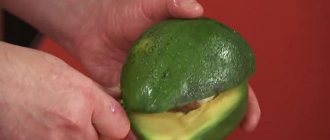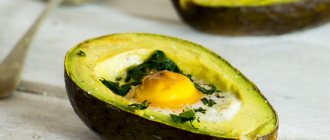Avocado, another name for which is alligator pear, is a fruiting evergreen plant from the genus Perseus, family Laurel. The fruit in its composition and taste resembles a vegetable, but it is a fruit. The calorie content of an avocado depends on the fat content of the product, but on average it is approximately 160 kcal per 100 g. Nutritionists widely recommend using an avocado diet for weight loss. It has gained immense popularity due to its beneficial effects on the entire body.
This article will look at the KBJU ratio of avocado, whether it is useful for weight loss, and we will also talk about its properties and review reviews of the results of the diet.
Calorie content of fresh berries
The high calorie content of avocados is due to the fat content - about 15% by weight of the product. Don't be afraid - these are monounsaturated "healthy" fats that, when consumed in moderation, help lower cholesterol levels. Adding these fats to your daily diet will provide energy and help your body absorb nutrients better. Average calorie content 1 pc. fresh avocado is 150-160 kcal.
How many calories are in 100 g
Many people are hesitant to use avocado for weight loss due to its high calorie content, but in vain. Recent studies have proven that no matter how many kilocalories are contained in 100 g of avocado, it promotes weight loss.
The average calorie content of an avocado per 100 g is 160 kcal (according to the National Nutrient Database for Standard Reference, USDA).
How many kilocalories are in 1 piece.
Data indicating how many calories are contained in 1 avocado depends on the weight of the fruit. The weight of an avocado is 110-150 g. The pit and peel together weigh approximately 30 g, i.e. to determine the weight of the main product, you need to subtract 30 g from the total mass. Knowing the weight of one unit, it is very easy to independently calculate how many calories are in one avocado.
The calorie content of 1 piece, depending on the size, is 128-192 kcal. You might be interested in knowing the calorie content of bananas, mangoes
Chemical composition
Avocado's calorie content, chemical composition and nutritional value make it possible to use the product in restorative nutrition, dietary complexes to replace protein and calcium, which enter the body with animal products.
The fruit contains a large number of microelements in proportions per 100 g:
- iron enhances oxygen metabolism, improves the functioning of the circulatory system, participates in the synthesis of hemoglobin, normalizes metabolic processes, stabilizes the functioning of the immune system;
- magnesium strengthens nails, improves the appearance of hair, stabilizes hormonal levels;
- fluorine is involved in the formation of the skeletal system, cellular metabolism, stabilizes the functioning of the brain and nervous system, regulates metabolic processes in the body;
- Selenium improves the body's protective properties, is involved in protein metabolism, stimulates metabolic processes, stabilizes reproductive function, improves the circulatory system, improves the condition of nails, skin, hair, reduces the harmful effects of free radicals;
- iodine is responsible for metabolic processes, regeneration, enhances the rate of biochemical reactions, regulates the processes of neuropsychic development, oxygen consumption by cells, is responsible for energy exchange, the synthesis of protein compounds, water and fat metabolism;
- calcium normalizes the condition of the skin, evens out the tone, gives elasticity to the dermis;
- sodium is involved in metabolic processes, in kidney function, stabilizes the nervous system, digestive organs, increases the absorption of glucose and amino acids by cells;
- magnesium stimulates the production of collagen fibers, triggers cell renewal processes;
- iron improves facial tone, stabilizes hydrobalance, normalizes the condition of blood vessels, increases the elasticity of the dermis;
- zinc is an antioxidant, prevents premature aging, rejuvenates skin cells, dries out inflamed dermis;
- copper is an antioxidant substance, triggers regeneration and rejuvenation processes in the body, stimulates the formation of collagen, histamine, melanin, reduces the harmful effects of free radicals, improves the condition of blood vessels, stimulates the synthesis of protein and carbohydrate compounds, has an anti-inflammatory effect, improves the functioning of the hormonal and nervous systems ;
- Potassium stabilizes the hormonal system, the emotional background, improves skin condition, helps normalize the functioning of the sebaceous glands, and has an anti-inflammatory effect.
We recommend that you read: The effect of tangerines on the stomach
Avocado contains the following components:
- retinol enhances cell regeneration processes, restores skin, enhances the body's protective functions, stabilizes the hormonal and nervous systems;
- thiamine in proportions per 100 g of the component contains up to 7%, the vitamin strengthens muscles, normalizes metabolic processes in the body, participates in the structure of cells, and is part of enzymes;
- pantothenic acid improves vision, metabolism, strengthens blood vessels, accelerates cell growth, and starts regeneration processes;
- Vitamin E improves the absorption of fats and protein compounds, stabilizes tissue respiration processes, normalizes brain activity, the functioning of the circulatory and nervous systems, accelerates wound healing processes, slows down the aging of the body, because has antioxidant properties;
- vitamin A (retinol) improves the condition of the skin and hair, starts recovery processes in the body, improves cellular metabolism, increases blood flow, promotes cell regeneration;
- vitamin B6 participates in metabolic processes in cells, promotes restoration of the body, reduces the harmful effects of medications, improves the condition of blood vessels and skin, and stabilizes the nervous system;
- vitamin B9 (folic acid) promotes cell development, accelerates regeneration processes in the body, the substance is involved in the synthesis of blood cells (erythrocytes, platelets), improves digestion processes, stabilizes metabolism, improves the condition of the nervous system, necessary during pregnancy;
- Vitamin K improves skin hydrobalance, evens out complexion, enhances the body’s protective properties;
- vitamin C enhances the protective properties of the body, increases the elasticity of blood vessels, improves the condition of the nervous and circulatory systems, enhances the activity of the endocrine glands, increases the intensity of iron absorption, stabilizes the process of hematopoiesis, improves the protective characteristics of the dermis, gives it elasticity;
- Vitamin D is responsible for the stability of the skeletal system, promotes cell growth, prevents rickets, improves the condition of hair, teeth, nails, regulates the hydrobalance of flaky dermis, and prevents anti-aging changes.
How to eat?
Before use, remove the outer skin and remove the pit. Avocados can be eaten raw or stewed, fried, boiled or baked - your choice. The taste of avocado is similar to butter, only with the addition of nuts and herbs. It is practically not used as an independent product - it is recommended to add at least one more ingredient, only then will you be able to experience all the delights of the taste.
Avocado is well suited for adding to various salads, soups, cold appetizers, sushi or sandwiches. Perfectly compatible with meat, various fish, seafood or vegetables.
Cooking options as part of the diet
Many people wonder whether or not they can eat avocados when losing weight. Like many diets, this one is no exception. It is based on weight loss by cutting calories in foods and increasing the consumption of foods that are rich in fiber. This combination eliminates toxins and allows the body to partially use fat reserves. The diet will work 100% if you know how to eat avocado for weight loss. Banana diet.
How to cook?
To achieve maximum results, you need to know how to cook avocados for weight loss. You can make sandwiches, various soups, sushi, light snacks and salads. The most popular and beloved dish by all is guacamole, which contains pureed fruit pulp, lime juice and a pinch of salt. Some also add vegetables and spices. Before you make a choice in what form to eat avocados, you need to remember that only fresh avocados have the most beneficial substances. Important: The result of losing weight depends on how and with what you eat avocados.
Nachos with avocado guacamole
How to eat?
To clean, you need to make a cut along the fruit and then turn it in opposite directions. If the fruit is ripe, this will not be difficult. Then you need to remove the pit and separate the pulp from the peel. It is recommended to eat avocado immediately or use it in cooking, as when exposed to oxygen it begins to darken, losing its appearance. To slow down this process, sprinkle lemon juice on the avocado. How to properly peel a pineapple and cut a mango?
Not everyone knows how to eat avocados to lose weight. A diet based on this product, subject to certain rules and diet, will help you “become lighter” by 2 kilograms in 7 days. To do this, you need to eat 4 times a day at equal time intervals; snacking is unacceptable. It is also necessary to exclude alcohol, sweets and all other products that contain harmful carbohydrates.
Avocado Nutritional Value and Health Benefits
Avocados are a wonderful food for older people. They're full of fiber and other nutrients like folate (vitamin B) and healthy fats that benefit us as we age. Over the past 15 years, avocado consumption in Russia has increased significantly. Several trends are driving demand, including the fruit's availability and impressive nutritional benefits.
- Calories: 227 kcal
- Fat: 21 g
- Sodium: 11 mg
- Carbohydrates: 12 g
- Fiber: 9.2 g
- Sugar: 0.4 g
- Protein: 2.7 g
Carbohydrates in Avocado
Most of the carbohydrates in avocados come from fiber. A whole avocado provides about 12 grams of carbohydrates and nine grams of fiber. A larger avocado can provide up to 13.5 grams of fiber. One serving of avocado contains about 2.5 carbohydrates and two grams of fiber.
The glycemic load of one serving of avocado is estimated to be one.
Fats in Avocado
Most of the calories in an avocado come from fat. A whole avocado contains about 21 grams of fat, but mostly in the form of healthier monounsaturated fats. The larger fruit (201 g) contains up to 30 g of fat, 4.2 g of saturated fat, almost 20 g of monounsaturated fat and 3.6 g of polyunsaturated fat.
Protein in Avocado
One serving of avocado provides less than one gram of protein. A whole avocado provides less than three grams of protein.
Micronutrients in Avocado
If you only consume one serving of avocado, it will not provide enough vitamins or minerals simply because the amount you eat is so small. But whole avocados are a good source of vitamin K, vitamin C, folate, vitamin E, riboflavin, niacin and pantothenic acid.
Minerals in whole avocados include magnesium, potassium, copper, manganese and magnesium.
Is it possible to eat at night?
Many people wonder: is it possible to eat avocados at night when losing weight? Including this fruit in your dinner is not only allowed, but also recommended. To do this, you can use a wide variety of dishes containing avocado. The absence of smoked, fatty, fried or salty foods is important. Give preference to salads, fruit or vegetable snacks, or rolls. Is it possible to eat bananas at night? Read here.
Avocado and weight loss
About this theme
Calorie deficit for weight loss
Since avocados are high in calories, they can be beneficial if you are trying to lose weight. Fat and fiber can help you feel full and satisfied. You can keep this creamy food in your diet, but you have to be careful about how much you eat—count your calories on smartphone apps to make sure you don't get it wrong.
You can use avocados instead of other foods that provide less healthy fats, such as butter or margarine, which may contain saturated fat or trans fat. As long as you keep your avocado calories in check and only eat a tablespoon of avocado (or even a little more), you should be able to meet your daily calorie goal.
Review of reviews of the results of use
Before starting to learn a new diet, you need to consult a specialist.
It should not be used by minors or people with health problems. On various forums you can find a huge number of reviews about the avocado diet for weight loss. Users share their experiences, recipes and give advice.
Reviews and results of eating avocados for weight loss are completely different. But this is understandable - after all, avocado, like any other diet, has certain positive and negative sides. If we summarize all the reviews related to the use of avocados for weight loss, we can draw a certain conclusion. The diet will be an excellent choice for lovers of exotic foods.
Positive aspects of the diet:
- weight comes off quickly;
- Avocado tastes great and is easy to eat;
- The high nutritional value of the product causes a feeling of fullness.
Negative side of the diet: not suitable for the long term.
Avocado can be a good helper in the fight against excess weight, but only if it is used correctly and carefully.











